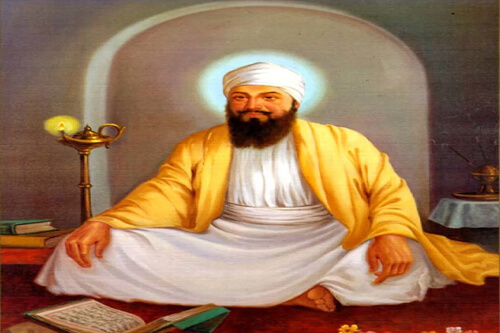GURU TEGH BAHADUR

Guru Tegh Bahadur: The Ninth Sikh Guru and Martyr for Religious Freedom, the ninth Guru of Sikhism, stands as a towering figure in Indian history, revered for his spiritual wisdom, selfless sacrifice, and unwavering commitment to the principles of justice and religious freedom. Born Tyag Mal on April 1, 1621, in Amritsar, Punjab, Guru Tegh Bahadur's life was a testament to resilience, compassion, and devotion to God. This article delves into the life, teachings, and martyrdom of Guru Tegh Bahadur, highlighting his enduring legacy in Sikhism and beyond.
Early Life and Spiritual Journey:
Tyag Mal, later known as Tegh Bahadur, was born to Guru Hargobind, the sixth Sikh Guru, and Mata Nanaki. From an early age, he displayed a deep sense of spirituality and wisdom. His upbringing in the Sikh tradition, coupled with the teachings of his illustrious predecessors, laid the foundation for his spiritual journey.
Upon assuming the Guruship in 1664, Tegh Bahadur embarked on a mission to spread the message of Sikhism and uplift the oppressed. His teachings emphasized the importance of selfless service, humility, and devotion to the Divine. Under his guidance, the Sikh community flourished, attracting followers from diverse backgrounds.
Defense of Religious Freedom:
One of the defining moments of Guru Tegh Bahadur's life came when he championed the cause of religious freedom in the face of tyranny and oppression. In 1675, Kashmiri Pandits sought his protection against forced conversion to Islam by the Mughal ruler, Aurangzeb. In a bold display of solidarity, Guru Tegh Bahadur stood up to Aurangzeb's religious intolerance, refusing to bow down to injustice.
The Guru's unwavering commitment to upholding the right to practice one's faith earned him the title of "Hind Ki Chadar" (Shield of India). Despite facing grave dangers, he remained steadfast in his resolve, becoming a beacon of hope for those persecuted for their beliefs.
Martyrdom and Legacy:
The ultimate sacrifice of Guru Tegh Bahadur came on November 11, 1675, when he was publicly executed in Delhi by Aurangzeb's orders. His martyrdom symbolized the triumph of righteousness over tyranny and inspired generations to stand up against oppression.
Guru Tegh Bahadur's legacy extends far beyond his martyrdom. His teachings continue to guide millions of Sikhs around the world, emphasizing the values of compassion, equality, and service to humanity. The Guru Granth Sahib, the holy scripture of Sikhism, contains hymns composed by Guru Tegh Bahadur, underscoring his spiritual insight and poetic brilliance.
The martyrdom of Guru Tegh Bahadur also had profound implications for the Sikh community. It strengthened the resolve of Sikhs to resist injustice and defend the principles of Sikhism. His sacrifice laid the groundwork for the Khalsa Panth's emergence under Guru Gobind Singh, ushering in a new era of Sikh sovereignty and empowerment.
Guru Tegh Bahadur's teachings have relevance in contemporary times, where religious intolerance and persecution continue to pose challenges to societies worldwide. His message of tolerance, compassion, and standing up for the oppressed resonates across cultures and faiths, serving as a guiding light for humanity.
Conclusion:
Guru Tegh Bahadur's life exemplifies the highest ideals of Sikhism – selflessness, courage, and devotion to God. His martyrdom remains a poignant reminder of the enduring struggle for religious freedom and justice. As Sikhs and admirers around the world commemorate his legacy, Guru Tegh Bahadur's teachings continue to inspire individuals to strive for a world where all can practice their faiths freely and live with dignity and respect.
